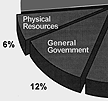Diane St. Marie, an area teacher and a Quaker, became a WTR after she had kids. "I'm not raising them to kill or be killed. I wanted to do something more than just rhetoric to show them how to work for nonviolence."
 <---- U.S. tax breakdown (click for full chart).
<---- U.S. tax breakdown (click for full chart).
Living below a taxable income and self-employment are the most effective methods for WTRs. Living on little money is, of course, entirely legal. Various forms of self-employment have the advantage of making it difficult for the IRS to assess and collect tax. Some resist collection by not holding assets that the IRS can seize, or by misreporting their withholding allowances. There are other methods as well, including telephone tax nonpayment.
In addition to choosing a method of resistance, WTRs must decide whether or not to file an income tax return. Most feel it is important to be public about their resistance to one degree or another. They talk with family and friends, write letters to the editor, and lobby members of Congress. Since the purpose is political and moral, it makes sense to be visible. They hope to influence others to join them, and to speak truth to the power of military madness. According to Parrish, going public about tax resistance "counters the government publicity that such a thing is unthinkable."
Since it is illegal not to pay taxes, WTRs commit civil disobedience. The government may respond by trying to collect, especially if you send in your 1040 form marked "refuse to pay," which some do. The IRS can assess civil fines and penalties, levy paychecks and bank accounts, and sometimes seize property. Criminal sanctions are hardly ever imposed, although statutes are on the books.
Vivien Sharples, director of NACC and a resister herself, notes, "Most people's first fear is that they'll wind up in jail, but only 19 people of many thousands have been jailed since World War II for war tax resistance." The 19 were jailed only after lengthy proceedings during which they could have opted for collection or fines.
Besides nonpayment of yearly taxes, another method for WTRs is to resist the federal excise tax on the telephone bill. The phone company serves as tax collector for the government. It will tell the IRS if you don't pay, but will not turn off your phone service. Resisting phone tax can be tedious because the phone company will impose tedious paperwork on you. Other than that, it is relatively easy and safe. The IRS usually ignores the nonpayment because the amount involved is small.
A founder of the war tax resistance movement, Wally Nelson, once asked, "What would you do if I came into your office tomorrow with a cup in my hand, asking for contributions to enable me to buy guns and kill people I don't like?" For many, war tax resistance provides a clear answer to this question.
Carolyn Stevens is a war tax resister and a member of NACC. To find out more about war tax resistance, contact NACC at (206) 547-0952. NACC is also listed in the Do Something! Directory.
[Home]
[This Issue's Directory]
[WFP Index]
[WFP Back Issues]
[E-Mail WFP]
Contents on this page were published in the July/August, 1996 edition of the Washington Free
Press.
WFP, 1463 E. Republican #178, Seattle, WA -USA, 98112. -- [email protected]
Copyright � 1996 WFP Collective, Inc.
 <---- U.S. tax breakdown (click for full chart).
<---- U.S. tax breakdown (click for full chart).



